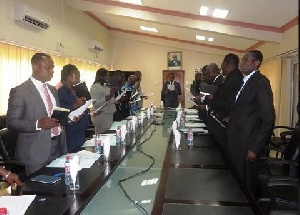A 15-member Council of the University of Professional Studies, Accra (UPSA) has been inaugurated to govern the affairs of the University for a three-year term.
The Council was inaugurated on Tuesday in Accra by Dr Matthew Opoku Prempeh, the Minister of Education.
It is under the Chairmanship of Dr Kofi Ohene-Konadu, the President’s nominee; with Professor Abednego Feehi Okoe-Amartey, UPSA Vice Chancellor as member.
Other members include Prof Kwame Frimpong, Mr Maxwell Donkor and Ms Akyaa Afreh Arhin; all nominees of the President.
The rest are Mr John Selorm Kwame Agbenyo, Convocation representative; Madam Gladys A. A. Nabieu, University Teachers Association of Ghana, Mr Kwabena Akuamoah Agyekum, Chartered Institute of Marketing Ghana, and Mr Mark Badu-Aboagye, the Ghana National Chamber of Commerce rep.
Others are Dr John Kwaku Mensah Mawutor, Alumni rep, Mr Israel K. Nyatuame, Teachers and Educational Workers (TEWU) rep; Nana E.C. Acquah of the Conference of Heads of Assisted Secondary Schools; Nii Adotei Abrahams of the National Council for Tertiary Education; Mr Justice Gadugah of the UPSA Students’ Representative Council and Ms Dorcas Oye Haywood-Dadzie of the UPSA Graduate Students’ Association of Ghana.
Dr Opoko Prempeh, who administered the Oath of Office and Secrecy to the new Council Members, said they were required by the UPSA Act 850 (2012) to ensure the implementation of the aims of the University.
He said it was the duty of the Council to determine the University’s strategic direction and monitor and evaluate its policy implementation, promote income-generating activities as part of the University’s programme, control its and determine the allocation and proper use of funds.
“You must ensure the creation of an environment of equal opportunity for members of the University without regard to ethnicity, sex, race, religious belief or political affiliation,” he said.
Dr Opoku Prempeh charged the Council to propose workable solutions to issues confronting the UPSA and hailed it for not depending on government for its subventions.
He said as part of efforts to deal with the problem of adequate funding of higher education, government had committed itself to the establishment of a National Research Fund for the sole purpose of funding relevant and sector specific research work in the institutions of higher learning; adding that; “This is in addition to the Book and Research Allowance”.
He said the National Research Fund Bill would be placed before Parliament in October for passage into law.
Dr Opoku Prempeh, therefore, appealed for input into the National Research Fund Bill in line with the Government’s new policy direction.
On the University’s admission system, the Minister proposed that the creation of a common admission platform by the National Council for Tertiary Education for undergraduate enrolment would ensure equal opportunities for all and sundry.
He also appealed to all public universities to include Diploma in Education Programmes in their curricular, which would go a long way to empower them to give training to their newly recruited lecturers on how to deliver as teachers.
Regarding the issue that universities having to seek clearance from Parliament before fixing new school fees, the Minister said the approval of fees and charges by Parliament was in compliance with the Fees and Charges Act.
He said government was fully committed to promoting tertiary education in the country as a means of equipping its citizens with the tools vital for national development.
Dr Opoku Prempeh said the Ministry had embarked upon the review of the legal, institutional and regulatory framework of the agencies under it to ensure that their roles were properly outlined to provide a clearer understanding of their functions and strengthen their mandate to perform efficiently.
He cited the National Council for Tertiary Education Act 454 (1993) and the National Accreditation Board Act 744 (2007), which were currently undergoing review.
Dr Ohene-Konadu, on behalf of the Council, expressed gratitude to the President for the confidence reposed in them.
He said they would use the Council as a tool and not a weapon for the advancement of the University and the nation.
General News of Tuesday, 8 August 2017
Source: Ghana News Agency

















